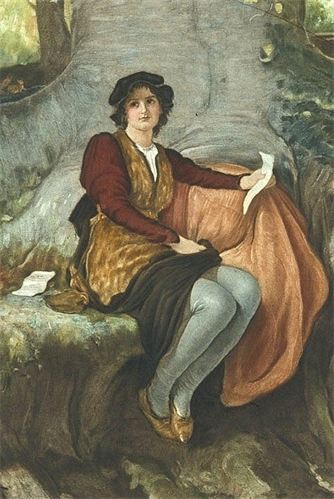Valentine’s Day
I didn’t plan it this way, but it just so happens that my teaching of Shakespeare’s As You Like It in my Introduction to Literature class coincides with Valentine’s Day. I couldn’t have picked a better work.
That’s because Shakespeare’s delightful play is a thoughtful meditation on the nature of love. Although the dialogue is sometimes difficult to follow, the students have had little difficulty with the central dramas.
To refresh your memory of the play, young Orlando, a superior wrestler, must flee for his life from his tyrannical older brother. First, however, he has an encounter with fair Rosalind, and while they experience an instant mutual attraction, he can’t muster up the proper words to talk to her. As he puts it,
What passion hangs these weights upon my tongue?
I cannot speak to her, yet she urged conference.
It so happens that the class is filled with student athletes like Orlando. Many relate to his awkwardness.
Orlando runs off to the Forest of Arden. Rosalind, meanwhile, is banished by her uncle, who has previously overthrown her father. Disguised as a man and accompanied by her cousin Celia, she too runs off to Arden (but without knowing about Orlando) since that is where her father now resides. By placing love in the pastoral world of nature, Shakespeare wants to separate it from civilization’s rules and examine it in a purer state.
Orlando may not be able to talk to women, but he can write bad love poetry, as well as inscribe Rosalind’s name on trees. My students have decided that these are his versions of Valentine’s Day cards and rituals. Here he is declaring his intent:
Hang there, my verse in witness of my love,
And thou, thrice-crowned Queen of Night, survey
With thy chaste eye, from thy pale sphere above
Thy huntress’ name that my full life doth sway.
O Rosalind! These trees shall be my books,
And in their barks my thoughts I’ll character,
That every eye which in this forest looks
Shall see thy virtue witnessed everywhere.
Run, Run, Orlando, carve on every tree
The fair, the chaste, and unexpressive she.
And here is one of his cheesy verses:
From the east to western Ind,
No jewel is like Rosalind.
Her worth being mounted on the wind,
Through all the world bears Rosalind.
All the pictures fairest lined
Are but black to Rosalind.
Let no fair be kept in mind
But the fair of Rosalind.
The verse is so bad that Touchstone, the fool, comes up with a bawdy parody. Note the dirty pun in the last line:
If a hart do lack a hind,
Let him seek out Rosalind.
If the cat will after kind,
So, be sure, will Rosalind.
Winter garments must be lined,
So must slender Rosalind.
They that reap must sheaf and bind,
Then to cart with Rosalind.
Sweetest nut hath sourest rind;
Such a nut is Rosalind.
He that sweetest rose will find
Must find love’s prick, and Rosalind.
Bad though Orlando’s poems are, however, Rosalind is totally smitten with them, especially when she discovers that Orlando is the author. That’s the way it is with Valentine’s Day poetry: it’s the sentiment, not the execution, that counts.
My women students found thoroughly modern Rosalind’s joyful hysteria when Celia tells her about Orlando:
What did he when thou saw’st him? What said he? How looked he? Wherein went he? What makes him here? Did he ask for me? Where remains he? How parted he with thee? And when shalt thou see him again? Answer me in one word.
Realizing that Orlando needs some courtship lessons before she can reveal her identity to him, Rosalind, in her male disguise of Ganymede, tells Orlando that he can practice making love to him/her. In homoerotic scenes which themselves are tintillating, the two make love, thus paving the way for their ultimate heterosexual marriage.
Of course, in the all male Elizabethan stage, Ganymede would have been a male actor pretending to be a woman pretending to be a man pretending to be a woman pretending to make love to a man so that in the end she can cast off her male disguise and really make love to this man (although of course it’s all pretend since this is a play).
All the different kinds of love are seen in Arden. There is the higher love of Orlando for Rosalind. There is apparent homosexual love between Orlando and Ganymede. There is mere physical love between Touchstone and the country girl Audrey (he marries her because he wants to satisfy his sexual cravings). There is apparent lesbian love when shepherdess Phoebe falls for Rosalind (although she thinks Rosalind is the man Ganymede). There is hopeless and unrequited love, that of the shepherd Sylvius for Phoebe. And there is the ironic eye of Jaques overlooking it all and complaining when lovers act silly and desecrate the trees with love poetry.
While people may fantasize that love is easier in a state of nature away from all of society’s rules, Shakespeare points out that it’s still pretty complicated. However, as in Shakespeare’s other “green world” comedies (think especially of Midsummer Night’s Dream), the lovers are able to get everything sorted out in Arden, at which point they can return to civilization and take up their adult responsibilities.
Meanwhile, the students in the class (and I remembering back to my high school and early college years) were able to feel not quite so alone in their own lovesick suffering. Relationships may be hard, but at least As You Like It (a) relieves our misery by presenting us a comic version of it, (b) points out that those we love may be just as mixed up as we are, and (c) provides us with an outcome to hope and strive for.
Happy Valentine’s Day.
